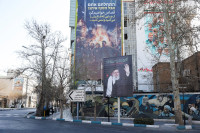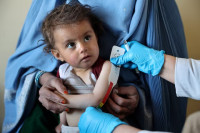World
A teen’s turn to radicalism and the U.S. safety net that failed to stop it
A onetime honor student from Virginia steadily embraced radicalism, supporting the Islamic State and urging others to do the same. Ali Shukri Amin’s path landed him in prison – and exposes a scattershot U.S. approach to steering young Americans away from extremism.
Reuters
In real life, he was 17, small for his age and with a deformed hand he often hid in his pocket. Online, he was @AmreekiWitness, among the most active pro-Islamic State Twitter accounts.
For months, Ali Shukri Amin had been walking closer and closer to a line. In 2014, the suburban high school student began tweeting instructions on how to use Bitcoin to fund the extremist group. Early in 2015, he helped a schoolmate, Reza Niknejad, travel to Syria to join the Islamic State – an escalation culminating in Amin’s arrest that February.
Last June 11, the onetime honor student pleaded guilty to conspiring to provide material support to a foreign terrorist organization. Now, the U.S. government has uncorroborated information that his 18-year-old schoolmate died overseas.
For two years before Amin stood in court and admitted guilt, a number of people tried to tame his increasingly radical views: his friends and family, a religious leader, a former Taliban recruiter. The U.S. State Department’s now-shuttered “Think Again Turn Away” Twitter campaign tried to dissuade him.
Yet these interventions were scattershot, and the inability to halt Amin’s path to extremism is symptomatic of a fractured U.S. effort to deter young Americans from joining militant Islamist groups. While a large body of research and programs target U.S. youth drawn to gangs, no such system exists for those drawn to extremist ideology.
Nearly 15 years after the Sept. 11 attacks, the case of Ali Shukri Amin shows, the United States lacks a clear strategy or adequate resources to turn young Americans away from radicalism, or to deradicalize them once incarcerated.
The muddled effort comes as U.S. terror-related arrests escalate. In 2015, at least 71 people were charged in jihadi-related cases, the most for any year since Sept. 11. More than 250 Americans have joined or tried to join extremist groups in Iraq and Syria, the House Homeland Security Committee estimated in September.
Last year, Congressional aides to that committee concluded a 2011 strategy to “empower communities” in tackling extremism lacked clear leadership or a defined budget, with progress difficult to gauge. Among the four federal agencies the aides examined, the combined annual budget for the effort was about $15 million – a fraction of the billions spent on more traditional counterterrorism measures.
Soon, the Department of Homeland Security will offer $10 million in grants to local groups, from faith leaders to mental health counselors to governments and law enforcement.
“Given the current scope of the threat, we believe family members, friends, coaches, teachers are best placed to potentially prevent and intervene in the process of radicalization,” said George Selim, director of the Department of Homeland Security’s Office of Community Partnerships and head of a new taskforce on countering violent extremism.
Yet community groups operate with limited means. Mosques, one potential line of defense against Islamic extremism, have a median income of $70,000, less than half the $150,000 for other religious congregations, a 2011 study by the University of Kentucky’s Ihsan Bagby found. Just 12 percent of U.S. imams have experience in clinical pastoral counseling, a 2012 Journal of Muslim Mental Health study found. Few mosques have trained youth directors.
“Most people are doing (counter-radicalization) on the fly,” said Mubin Shaikh, a former Taliban recruiter who studies Muslim interventions in counter-radicalization and who spoke with Amin on social media in 2014. “There’s nothing we can say absolutely works.”
SEEKING VALIDATION
Amin and his mother, Amani Ibrahim, immigrated to the United States from Sudan in 1999, when he was almost two. They lived in cramped quarters in Virginia with relatives for years, with Amin and his mother sharing a bed until she remarried in 2011. He was then 14.
Ibrahim was overprotective of her son, she wrote in a court letter, citing his chronic health problems and her fear “and sense of foreboding that something bad might happen to him.”
Shortly after Amin’s diagnosis of Crohn’s — an inflammatory bowel disease that can cause severe abdominal pain and diarrhea — at age 10, Ibrahim took him out of sports programs and didn’t let him sleep over at friends’ houses. He began spending time alone.
Both Amin and his mother declined interview requests from Reuters. Their views are detailed in court papers filed with his federal prosecution.
As a teenager, Amin began studying Islam apart from his family. The religion appealed to him on an intellectual level, he told a forensic psychologist, unlike the “more ceremonial” Islam practiced by his parents. His online research led him to Islamic State supporters, and he began communicating with them. Suddenly, the teen felt intelligent and valued, according to the psychologist’s report, filed in court papers after his arrest.
He was drawn to “idealistic pictures of jihad” as well as Islamic State’s arguments that an Islamic government would be superior to Western government, drone strikes were evil and Muslims were mistreated, Amin told the psychologist.
One of the Islamic State supporters Amin spent hours connected to, a Finnish teenager called Abdullah, said their views hardened over time. Amin told the psychologist he considered Abdullah, identified in court documents only by his first name, his best friend.
He has not been charged.
“In the beginning, it was just like supporting a group or supporting jihadists. When the infighting started in Syria, that’s basically when we became full-time ISIS supporters,” Abdullah, now 21, said in an interview. “We started saying suicide bombings against armies are OK.”
At Osbourn Park High School in Manassas, Virginia, Amin’s behavior noticeably changed. By 2013, his junior year, he had become increasingly hardline, chastising Muslim classmates if they didn’t complete their five daily prayers and trying to engage them in conversations about turbulence in the Middle East.
At the time, the Islamic State was clashing with the Syrian government and Syrian rebel groups, seizing control of major towns and opposition checkpoints. Known for kidnapping and killing critics and rival groups, it adeptly used social media to spread its views. The group appealed to young Muslims over Twitter and other social media and recruited young foreign fighters, some from the West, to join its ranks.
On a group chat in the fall of 2013, three of Amin’s classmates tried to temper his radical views. “We would try to make fun of the things he would say,” one classmate said in an interview, noting he never took Amin’s views seriously. “We would say things like: ‘A bunch of illiterate idiots are running around ruining the name of Islam.’ And Ali would say: ‘Hitler was literate, Hitler was Christian.’ It seemed like he was taking sides with the terrorists.”
As Amin’s focus intensified in 2013, the number of Twitter accounts supporting the terror group nearly doubled, according to a study by the Brookings Institution think tank.
In late 2013, Amin suffered a Crohn’s flare-up that landed him in the hospital and caused him to miss several weeks of school. He had to leave a prestigious program he had begun that August that allowed him to take college-level courses through George Mason University while still in high school.
Shortly after Amin left the program, his parents noticed him spending more time in his room. They looked through his phone and computer and found messages about jihad and Islamic State.
“I never thought that letting him have access to the Internet by himself would put him at the risk of finding the wrong information about Islam and meeting the wrong people,” his mother, Ibrahim, wrote. “I see now that I was not only naïve, but had abandoned an important responsibility.”
After discovering his online activity, Ibrahim and Amin’s stepfather, Yassir Rustom, met with Mohamed Magid, a Virginia imam known in their community for counseling youth drawn to extremist groups. He advised them to bring Amin to him.
SCATTERSHOT ATTEMPTS
Magid has performed counter-radical counseling since 2011. The son of a prominent Islamic scholar and legal expert in Sudan, Magid studied under his father and gained certifications in counseling and Islamic studies before moving to the U.S. in 1987.
Magid and Amin met and talked about connecting over Skype, with the imam planning to give him lectures from an Islamic book called Al Akhdari. But after Amin’s parents took away his phone and computer after the first meeting, Amin moved in with his uncle and the second meeting never happened.
Magid said he has counseled several people like Amin: isolated, vulnerable and seeking a sense of purpose. Recruiters tell them they are heroes and will be part of a cause larger than themselves. Amin felt an invincibility online he could never feel in real life, Magid said, and “was a typical case of a young person who had become very vulnerable in a life transition.”

Magid reached out to Amin at his uncle’s house after their first meeting and invited him to take part in one of the mosque’s week-long camps, a spring ritual where teens play sports, hike trails, paddle canoes and attend lectures on Islam. After the camp, Amin moved back in with his parents.
Magid is one of few people in the United States trained to counsel teenagers like Amin. He — along with the six contracted mosque counselors who advise on issues ranging from marital problems to mental health — have long waiting lists for appointments. Magid was “very busy” and could not see Amin regularly.
“I don’t know if we had enough time with Ali,” said Magid, who met with him once, spoke with him on the phone and interacted at the camp. “Maybe we could have changed him.”
FEELINGS OF INVINCIBILITY
Mubin Shaikh, the former Taliban recruiter now attaining a PhD studying Muslim interventions in extremism, spoke with Amin online in 2014. Since 2010, Shaikh has been engaging extremists online, trying to shift their views.
Amin’s Twitter timeline contained tweets on how to fund the Islamic State using Bitcoin, court records show, and he gave advice on online security and encryption.
“The adults in my life could not provide adequate answers,” Amin wrote the judge in 2015. With Islamic State, “For the first time I felt that I was not only being taken seriously about very important and weighty topics, but was actually being asked for guidance.”
“I don’t know if we had enough time with Ali.”
Mohamed Magid, a Virginia imam known for counseling youth drawn to extremism

Shaikh, who had been communicating with Amin on Twitter, messaged him on LinkedIn in April 2014, to see how he was doing.
Amin said he was in contact with the “very moderate” Magid. “I’ve grown disinterested in Twitter as it is,” Amin wrote, “so they don’t have to fear another Anwar al Awlaki our (sic) of me any time soon.” He was referring to the U.S.-born, social-media-savvy al-Qaeda cleric who was killed in a Yemen airstrike in 2011.
Amin had, at this point, been on the FBI’s radar for two months. The FBI received information he was communicating with Islamic State members and was beginning to espouse views supportive of violent jihad in February 2014, court records show.
Amin told Shaikh he knew a government agency had “confronted” Magid about speaking with him. He wrote he hadn’t “been up to anything suspicious. Just trying to be good and avoid any problems with the law for now.”
“The govt could easily have tagged you as a terrorist in court and your life would have been ruined,” Shaikh replied. “The fact you have been given a way out… be supremely grateful to Allah.”
Amin replied, “The government can’t touch a hair on my head unless Allah wills, and if so, how can I be displeased with what he has ordained?”
That summer, the Islamic State beheaded journalists James Foley and Steven Sotloff, and the United States launched airstrikes in Iraq and Syria.
In the United States, racially charged clashes in the St. Louis suburb of Ferguson over the killing of an unarmed black teenager dominated the news. Amin tweeted: “May Allah incite righteous jihad in #Ferguson and guide its people to Islam.” He aspired to raise “awareness about the upcoming conquest of the Americas, and the benefits it has for the American people,” his Twitter bio said.
“IS needs a face to the West who grew up there, understands the sentiment, is articulate but also knowledgeable Islamically,” he wrote in 2014. His account has been suspended; the SITE intelligence group provided Reuters with screenshots of his tweets.
In August 2014, Amin tweeted, “IS has flaws, but the moment you claim they cut off heads of every non-Muslim they see, the discussion is over.” The U.S. State Department’s “Think Again Turn Away” Twitter account responded: “#ISIS tortures, crucifies & shoots some-ISIS also gives ultimatums to Christians: convert, pay or die- Some flaws u say?”
The Think Again Turn Away account, criticized for being ineffective and sharing overly graphic content, has since been shut down. The State Department declined to comment.
In the fall of 2014, Amin’s parents again noticed his troubling online activity. On Magid’s advice, they reported Amin to the FBI in hopes of protecting their son from the Islamic State, his mother wrote the judge.
“We followed this advice and that decision contributed to Ali being investigated and prosecuted,” his mother wrote. “While we are glad that Ali did not go abroad, we also feel very confused and conflicted about having played a role in him being arrested.”
In his first meeting with law enforcement, Amin confessed to crimes. He and his parents subsequently met with FBI agents about four more times. After his arrest, he cooperated in the investigations of other Islamic State supporters, his lawyer said in court filings.
In his June plea, Amin admitted to radicalizing schoolmate Niknejad, putting him in touch with Islamic State contacts and accompanying him to the airport so he could travel to Syria. Niknejad became an Islamic State fighter in Syria, court records say.
The teen may have been killed in Iraq or Syria, a U.S. law enforcement official said, citing uncorroborated information.
His mother declined an interview request, but said her family is grieving. “As you know Reza wasn’t the only victim of radicalization,” she wrote.
Amin was sentenced to 11 years in prison, followed by a lifetime of supervised release. As of April 2016, he had received no counter-radicalization programming, said his lawyer, Joseph Flood.
“Mr. Amin has had no access to religious education, counter-radicalization or deradicalization services, or any other intervention program, much less one tailored to his individual circumstances,” Flood wrote in a court filing. “Critically, there is currently no such program available in the Federal Bureau of Prisons.”
The U.S. Federal Bureau of Prisons said it uses the same approach “to programming and release preparation for all inmates, including those linked to terrorism.”
Amin, now 18, is due to be released in 2025.




 25.92°C Kathmandu
25.92°C Kathmandu














